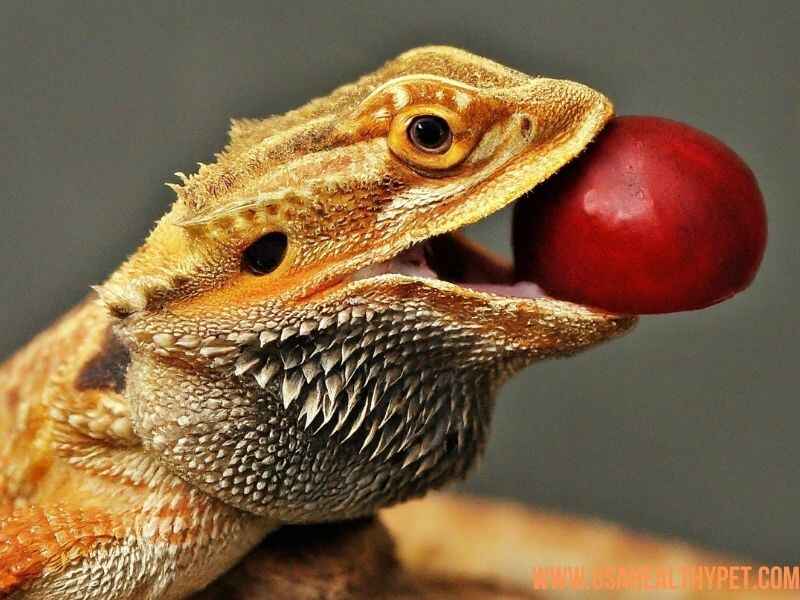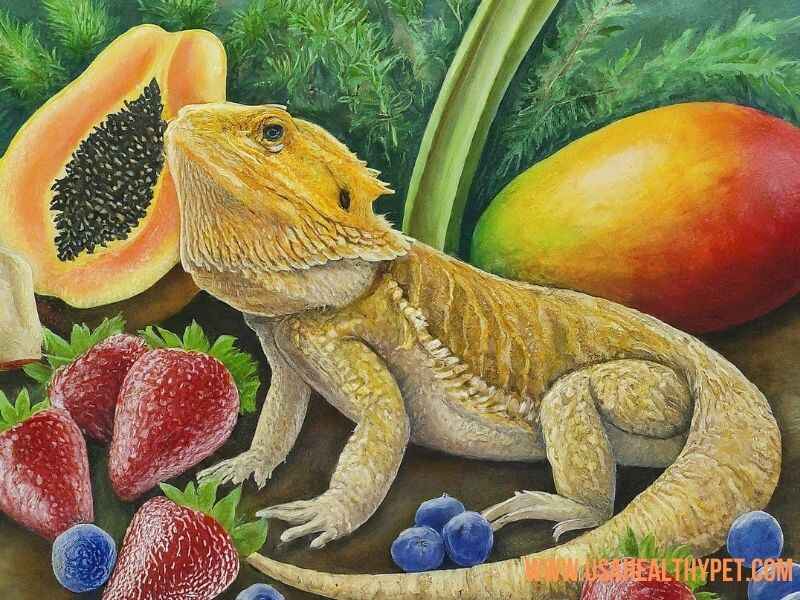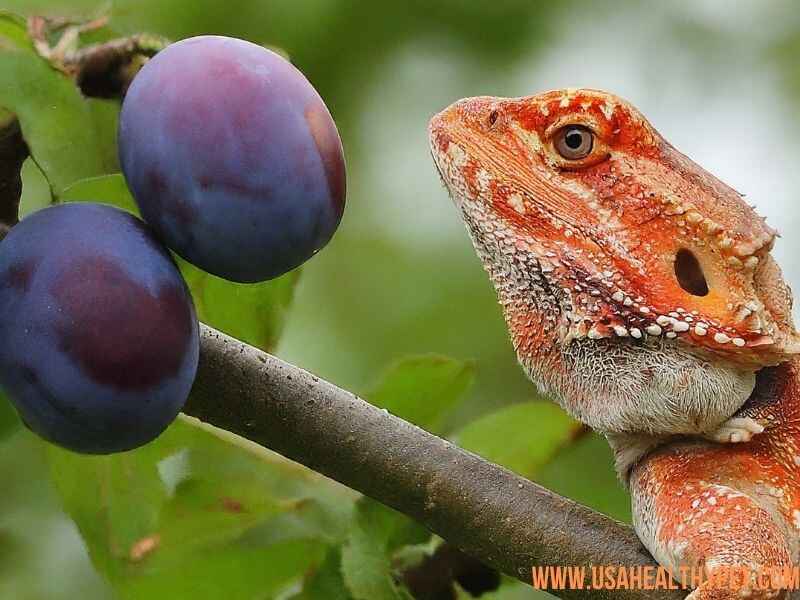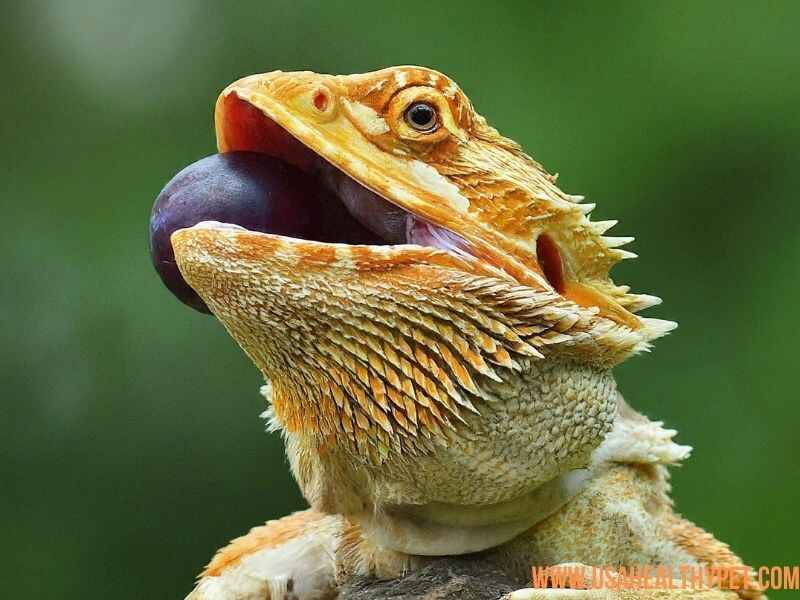Bearded dragons are fascinating little creatures, aren’t they? If you’re a bearded dragon owner, you’ve often asked yourself what’s safe for them to eat.
While they love munching on insects, veggies, and the occasional fruit, some foods can be a bit confusing.
Plums, for example, are common in households, and you might wonder if you can share this juicy fruit with your bearded buddy. So, can bearded dragons eat plums?
Let’s break it all down!
Can Bearded Dragons Eat Plums?
Yes, bearded dragons can eat plums, but only in moderation. While plums are not toxic to them, they do contain a high level of sugar and water, which can cause problems if overfed.
So, while your bearded dragon might enjoy a little taste of plum now and then, it’s definitely not something they should snack on regularly.
Think of plums as a “treat” – like how we might enjoy a piece of chocolate cake. Tasty? Yes. Healthy as a main meal? Not so much.
According to Dr. Karen Becker, a veterinarian, the bulk of a bearded dragon’s diet should come from leafy greens, vegetables, and insects. She highlights that while fruits like plums provide some nutrients, they lack the essential balance that your pet needs on a daily basis.
Nutritional Benefits of Plums for Bearded Dragons
Plums come with some nutritional perks! They contain essential vitamins and minerals that can be beneficial to your bearded dragon, such as:
- Vitamin C: Helps boost the immune system and support overall health.
- Fiber: Assists in digestion.
- Antioxidants: Help fight inflammation and protect cells from damage.
Dr. Terri Gibson, a reptile nutritionist, points out that while these benefits are real, they don’t offset the downsides of too much sugar. It’s all about moderation!

Potential Risks of Feeding Plums to Bearded Dragons
As much as we want to spoil our pets, too much of a good thing can be harmful. Here are some of the risks associated with feeding plums to your bearded dragon:
- High Sugar Content: Plums are loaded with sugar, which isn’t great for your dragon. Too much sugar can lead to obesity, digestive issues, and long-term health problems.
- Too Watery: The water content in plums can cause diarrhea or dehydration (ironically!) if your bearded dragon consumes too much.
- Calcium to Phosphorus Ratio: Plums have more phosphorus than calcium, which is a problem because too much phosphorus can interfere with calcium absorption. Calcium is critical for your bearded dragon’s bone health, and a poor balance can lead to metabolic bone disease (MBD).
Dr. Sophie Bell, notes that the calcium-to-phosphorus ratio is a critical factor in a bearded dragon’s health. Plums, unfortunately, have more phosphorus than calcium, which can disrupt calcium absorption and contribute to health issues like metabolic bone disease (MBD).
How Often Can You Feed Plums to Bearded Dragons?
Plums should only be given as an occasional treat, maybe once or twice a month. Think of them like a sweet snack that your bearded dragon doesn’t need often, but can enjoy every now and then. Moderation is key!
Best Way to Prepare Plums for Your Bearded Dragon
If you decide to offer your bearded dragon a bit of plum, here’s the best way to prepare it:
- Choose Ripe Plums: Make sure the plum is fresh and ripe, but not overly soft or spoiled.
- Wash Thoroughly: Wash the fruit to remove any pesticides or chemicals.
- Remove the Pit: Always remove the plum pit, as it can be a choking hazard.
- Cut into Small Pieces: Slice the plum into small, manageable pieces for your dragon to eat safely.

What Other Fruits Can Bearded Dragons Eat?
You may be wondering what other fruits are safe for your bearded dragon. While fruit should only make up a small portion of their diet, there are several good options, including:
- Apples (peeled and sliced)
- Blueberries
- Strawberries
- Mango
- Papaya
These fruits are lower in sugar compared to plums and can provide some variety in your dragon’s diet.
Fruits to Avoid for Bearded Dragons
Some fruits are better left out of your bearded dragon’s diet entirely. These include:
- Citrus Fruits (e.g., oranges, lemons): Too acidic and can upset their stomach.
- Avocados: Toxic to bearded dragons.
- Rhubarb: Also toxic and can cause serious health issues.
Can Baby Bearded Dragons Eat Plums?
Baby bearded dragons have different dietary needs compared to adults. They require more protein and calcium for proper growth, so fruits like plums should be even more limited in their diet.
Stick to nutrient-rich vegetables and insects for baby bearded dragons and avoid sugary treats like plums until they’re older.
Signs Your Bearded Dragon May Have Eaten Too Much Plum

If your bearded dragon eats too much plum, you might notice some negative reactions. Here are a few signs to look out for:
- Diarrhea: Due to the high water content in plums, too much can lead to loose stools.
- Lethargy: Overeating sugary fruits can lead to a temporary energy crash.
- Lack of Appetite: If your bearded dragon seems less interested in their usual food, it might be because they’re full from too many treats.
If any of these symptoms last for more than a day or two, it’s best to consult with a vet.
Balancing Your Bearded Dragon’s Diet
A healthy bearded dragon diet should consist primarily of leafy greens and vegetables, with insects as a key source of protein. Fruits, like plums, should be kept to a minimum due to their high sugar content. Here’s a quick breakdown of what your bearded dragon’s diet should look like:
- 50-60% Vegetables: Kale, collard greens, squash, and bell peppers.
- 20-30% Insects: Crickets, mealworms, and dubia roaches.
- 10-20% Fruit: Occasional treats like berries, apples, and, of course, plums in moderation.
By balancing their diet, you’ll ensure that your bearded dragon stays healthy and happy.
Common Questions About Bearded Dragons and Fruit
- Can bearded dragons eat fruit every day? No, fruit should only make up about 10-20% of their diet and should be given a few times a week at most.
- Are dried plums (prunes) safe for bearded dragons? No, dried fruits are even higher in sugar and can cause digestive issues.
Conclusion
So, can bearded dragons eat plums? Yes, but only occasionally in small amounts. While plums offer some nutritional benefits, their high sugar content and the imbalance of calcium to phosphorus make them more of a treat than a staple in your dragon’s diet.
Stick to a diet rich in vegetables and insects, and save the plum slices for a special snack every now and then.
If you’re ever unsure about what to feed your bearded dragon, it’s always a good idea to check with a reptile veterinarian.
FAQs
- Can I feed my bearded dragon plum skin?
- It’s best to peel the plum to avoid any pesticide residue or difficulty in digestion.
- How much plum is safe for a bearded dragon?
- A small slice, about the size of a fingertip, once or twice a month is plenty.
- Is it okay if my bearded dragon eats the plum pit?
- No, the pit is a choking hazard and should be removed before feeding.
- What should I do if my bearded dragon has diarrhea after eating plum?
- Offer plenty of fresh water and monitor them closely. If symptoms persist, consult a vet.
- Can bearded dragons eat plum leaves?
- No, plum leaves should not be fed to bearded dragons, as they can be harmful.
